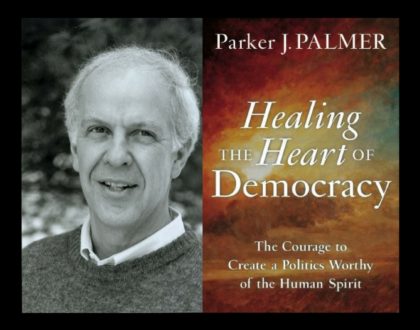Healing The Heart Of Democracy

The Courage To Create A Politics Worthy of The Human Spirit
Written by Parker J. Palmer & published in 2011
Book Overview:
Most Americans seem exhausted by the constant chatter of life online and the trauma that results when hate speech incites violence or vice versa. These days, there seem to be very few places of respite from this incessant noise and burden. Left unattended for even a single mindless moment, our attentions become snagged in webs of never ending arguments and fruitless disagreements or debates. We wrestle one another in anger and shame each other over lifestyles, ideas and beliefs.
“How did we forget that our differences are amongst our most valuable assets?”
According to Parker Palmer’s book Healing the Heart of Democracy, “rage is one of the masks that heartbreak wears.” Perhaps, in the grip of terrible heartache, we have grown accustomed to lashing out at one another and shredding what’s left of the civic fabric that binds the tenets of democracy together.
“Protecting our right to disagree is one of democracies gifts, and converting this inevitable tension into creative energy, is part of democracy’s genius.”
In a book that offers an in-depth view of the politics of the heart, Palmer argues that Lincoln’s case still holds true. “If American democracy fails, the ultimate cause will not be a foreign invasion, or the power of big money, or the greed and dishonesty of some elected officials, or a military coup or the internal communist/socialist/fascist takeover that keeps some Americans awake at night. It will happen because we, you and I, became so fearful of each other, of our differences and of the future, that we unraveled the civic community on which democracy depends.”
Right at the start of the book, Palmer suggest that “partisanship is not the problem” but “demonizing the other side is.” He goes on to explain his stance by declaring that he “will not ask to dial down our differences, will not plead for tolerance—a virtue so thin, it is barely a virtue.” Nor will he “spend much time pleading for better manners in public discourse,” because, as he sees it, “manners for the sake of manners are as thin as tolerance.” He asserts that, “the civility we need will not come from watching our tongues” but from valuing our differences.
“Democracy gives us the right to disagree. It is designed to use the energy of creative conflict to drive positive change.”
This book might resonate more with some readers in the present political climate then it did when first published in 2011. Palmer’s steady, optimistic philosophy, lofty in its high minded ideals is tempered by real-world examples of just how ‘”the heart’s alchemy can turn the worlds suffering into community, conflict into creative energy, and tension into an opening for the common good.”
“You and I can disagree profoundly on what constitutes a political failure or success but we can agree on this, Democracy is always at risk. Government of the people, by the people and for the people is a nonstop experiment in the strengths and weaknesses of our political institutions, local communities and associations and the human heart. It’s outcome can never be taken for granted.”
Palmer’s book compels the reader to admit that “within us is a yearning for something better than divisive toxicity, passivity, and powerlessness.” He argues that “within us is the courage to pursue that yearning, to hold that tension consciously, faithfully and well until it breaks us open.” He proclaims that “the broken open heart is a source of power as well as compassion, the power to bring down whatever diminishes us and raise up whatever serves us well.”
“We can access and deploy that power by doing what every great social movement has done; put time, skill and energy into the education and the mobilization of the powers of the heart.”
To learn more about Parker Palmer’s approach to politics, pick up the book Healing the Heart of Democracy at your local bookstore or library.
